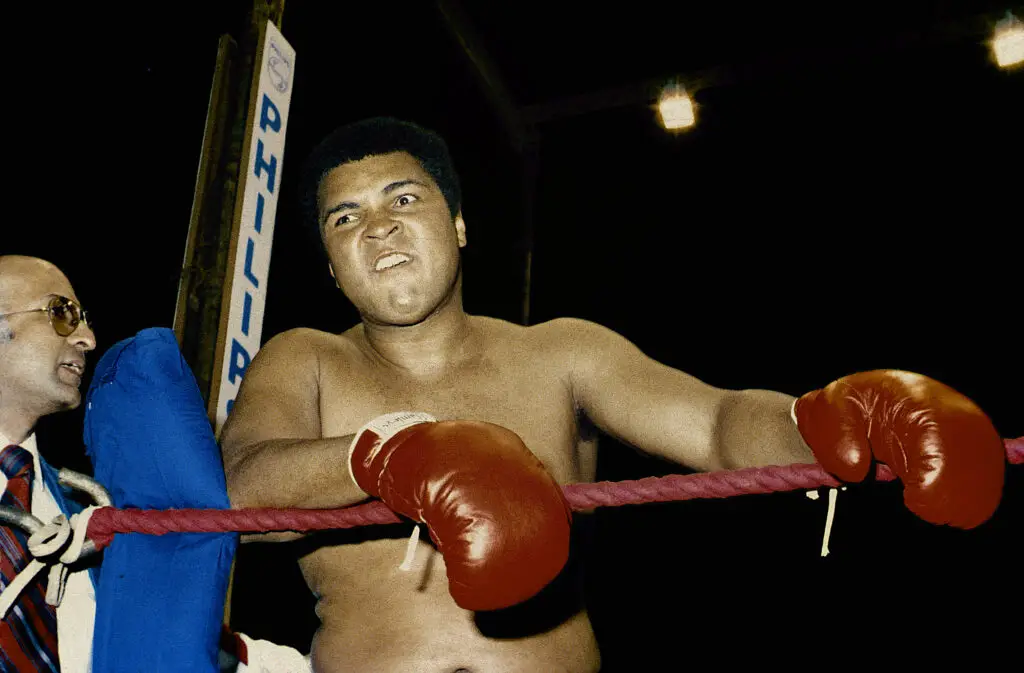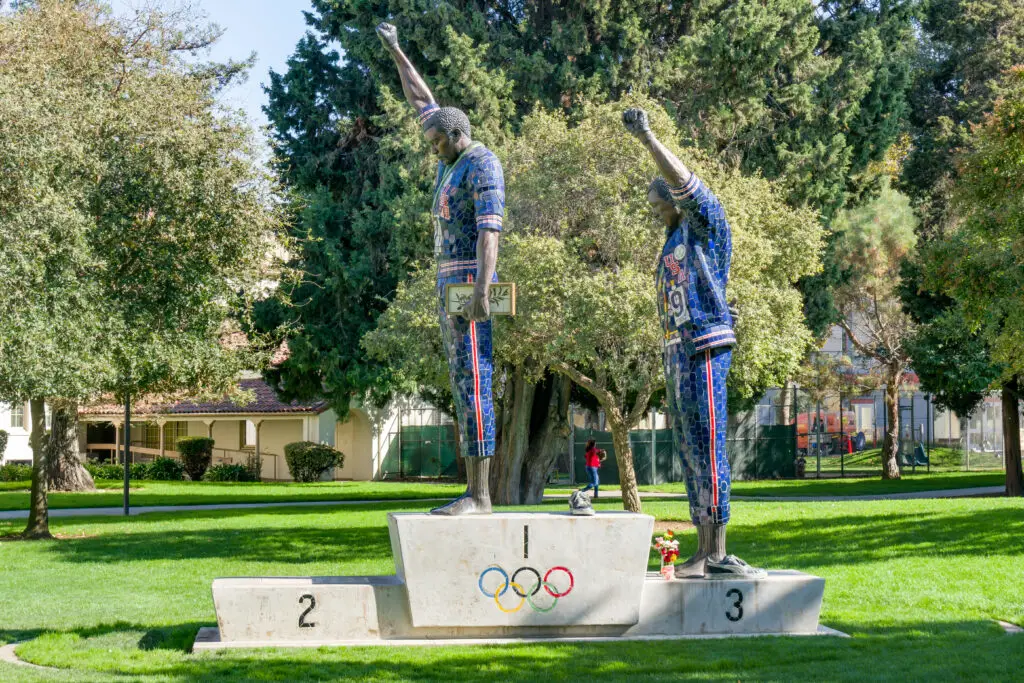1. Muhammad Ali: Banned for Refusing to Serve, but Became a Global Icon

Muhammad Ali’s story of defiance is legendary. In 1967, Ali was stripped of his heavyweight title and banned from boxing after refusing to be drafted into the military for the Vietnam War. His refusal stemmed from his strong beliefs against the war and his stance on religious principles as a Muslim. At the time, many viewed him as a controversial figure, even vilifying him for his outspoken position. But Ali’s fight wasn’t over, and it wasn’t just in the ring. The ban marked the beginning of a struggle for social justice and equality that would extend far beyond sports. He faced legal battles that lasted nearly four years before his conviction was overturned in 1971 says AARP. That year, Ali was finally allowed to return to the ring, and when he did, he came back stronger than ever. His legendary comeback included a rematch with Joe Frazier, the infamous “Fight of the Century,” in 1971, which, although a loss, set the stage for Ali’s resurgence. His return wasn’t just about reclaiming titles; it was about reclaiming his voice and purpose. By the time he retired, Ali was not only recognized as one of the greatest boxers in history but also as a transformative figure in American culture. His resilience in the face of adversity and his unwavering principles inspired millions.
Ali’s refusal to be silenced forever changed the way athletes viewed their influence beyond the sport. His courage paved the way for athletes to speak out on social issues and take political stances, with the confidence that their voices could have impact. He redefined what it meant to be a champion, showing that strength came not only from physical prowess but from inner conviction. Ali’s legacy is still felt today, and his story of defiance is a testament to the power of resilience. His impact transcended the boxing ring, and his return to the sport was a symbolic victory over adversity. He proved that sometimes, being banned isn’t the end of the story—it’s only the beginning of a much greater journey.
2. Colin Kaepernick: Banned for Kneeling, but Sparked a Movement

Colin Kaepernick’s decision to kneel during the national anthem in 2016 sparked one of the most significant social justice movements in sports history. At the time, Kaepernick was a starting quarterback for the San Francisco 49ers, and his protest was aimed at raising awareness about police brutality and racial injustice in the United States. However, his stance was met with severe backlash, and many viewed his actions as disrespectful to the flag and the military. Kaepernick was eventually not re-signed by the 49ers and faced a de facto ban from the NFL, despite being an effective quarterback. Critics claimed his protest cost him his career, but Kaepernick’s resolve remained unshaken. He filed a grievance against the NFL, alleging collusion by team owners to keep him out of the league. While he wasn’t able to return to the field, Kaepernick’s protest caught fire, and it became a rallying cry for athletes across various sports to use their platforms to speak out on issues of racial inequality. Kaepernick’s action was the spark that ignited the wider “Take a Knee” movement, with athletes like LeBron James and Serena Williams openly supporting him explains the Guardian.
Although Kaepernick did not return to the NFL, his influence was undeniable. His decision to kneel went from a solitary act to a global movement, leading to increased awareness and discussions around police violence and racial inequality. The activism that grew out of Kaepernick’s protest inspired athletes to take bold stances on social issues, showing that the sporting world was a powerful space for change. Kaepernick’s banishment from the NFL was seen by many as an unjust punishment for standing up for what he believed in. However, instead of silencing him, it amplified his message. While his football career may have been cut short, Kaepernick’s legacy as an activist and leader is now etched in history. His strength in the face of adversity, and his willingness to sacrifice his career for a cause greater than himself, made him a symbol of resilience. Kaepernick’s story is a reminder that sometimes standing up for what’s right comes with a heavy price, but the rewards can be even greater in the long run.
3. Tommie Smith and John Carlos: Banned for Raising Their Fists, but Their Protest Endured

At the 1968 Summer Olympics in Mexico City, American sprinters Tommie Smith and John Carlos made a statement that would go down in history. After winning gold and bronze medals, respectively, the two athletes raised their fists in a black power salute on the podium during the national anthem. This powerful gesture was a form of protest against racial inequality in the United States, and it was a moment that captured the attention of the world. However, their protest came with significant consequences. Both athletes were immediately expelled from the Olympic Games and faced widespread backlash from the public. Despite the controversy, Smith and Carlos remained firm in their beliefs says HISTORY. Their protest drew attention to the struggles of African Americans in the U.S. and became a symbol of resistance. Though their athletic careers were impacted by the ban, Smith and Carlos found strength in their activism. Over time, their actions were increasingly recognized as a courageous stand for justice. In the years that followed, both athletes continued to speak out on issues of race and inequality, solidifying their place in history as icons of protest.
The strength of their protest only grew over time, as their salute was recontextualized as an act of defiance against systemic racism. In recent years, both Smith and Carlos have been celebrated for their bravery and commitment to social justice, with many acknowledging that their protest helped to ignite conversations about race in America. The impact of their gesture reached far beyond the Olympic Games, and their banned actions became a part of the larger civil rights movement. They endured immense personal and professional fallout, but their courage in the face of adversity ensured that their message resonated for decades. The power of their protest lies not in the medals they earned, but in the way they used their platform to challenge societal norms. Smith and Carlos’ story shows that sometimes, standing up for what is right requires great sacrifice. Despite the ban, their legacy endures as one of the most iconic moments of protest in sports history.
4. Jackie Robinson: Banned from Major League Baseball, but Changed the Game Forever

Before Jackie Robinson broke the color barrier in Major League Baseball (MLB), black players were banned from the league through an unofficial policy of racial segregation. Robinson’s entry into MLB in 1947 was a groundbreaking moment in American history. The Brooklyn Dodgers signed Robinson, and he became the first African American to play in the major leagues in the modern era. However, this historic achievement came with intense challenges. Robinson faced immense racism from fans, fellow players, and even team management. Despite the hostile environment, he maintained his composure and demonstrated extraordinary resilience explains the MLB. Robinson’s courage in the face of such adversity changed the course of history and ultimately led to the integration of MLB. His ability to handle the racial abuse and still perform at the highest level showed that he was not just an athlete, but a trailblazer. Robinson’s impact reached beyond the baseball diamond—his success helped pave the way for civil rights advancements in the U.S.
While Robinson was never technically banned from the league, his struggle to break through the racial barrier made him a symbol of overcoming racial injustice. His talent and perseverance eventually led to his induction into the Baseball Hall of Fame in 1962, cementing his legacy as one of the most important figures in sports history. Robinson’s story illustrates the power of resilience in the face of institutionalized discrimination. His legacy lives on not only in the sport of baseball but in the broader context of civil rights. Robinson’s groundbreaking career showed that systemic barriers could be broken, and his example inspired generations of athletes to challenge the status quo. The ban he faced was one of a nation’s unwillingness to embrace equality, but Robinson’s strength and achievements forced that change. His contribution to the American civil rights movement is undeniable, and his place in history as a champion of equality remains secure.
